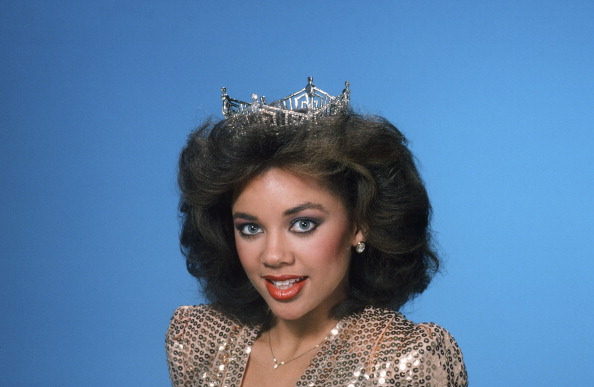
Source: NBC / Getty
In the latest episode of A&E’s The Table Is Ours podcast, Vanessa Williams opened up about how it felt to become the first Black Miss America, and what it was like to receive backlash surrounding not being the “ideal” winner for many viewers both in and out of the Black community.
Speaking to hosts Kirby Dixon and Amira Lewally, Willams shared that when she scored her historic win at the young age of 20 years old in 1983, a lot of pressure was placed on her to be an emblematic figure. For her, the win felt especially challenging because as the first Black woman to earn the Miss America crown, people just weren’t used to seeing someone like her in that role during that time.
“I was not seen as a 20-year-old, who is a junior in college,” Williams said about the time of her win. “I was seen as a symbol. But also seen as a Black woman. And also seen as someone who was supposed to represent the ‘American beauty.’ And there are a lot of folks that did not believe that having brown skin and being a Black woman represented the Miss America ideal.”
Speaking on how unhappy some were with her new title and how dangerous things got, the multi-hyphenate continued, “I had death threats. I had sharpshooters when I did my homecoming parade. There were sharpshooters on the top of roofs of my hometown just because of the threat. The threats that were you know — against me because of who I was.” Discussing how the Black community played a big role in the vulnerable position she was in, the star later added, “The people that are crazy and want to kill you and your family, that’s one thing, but it was like my own. My own people.”
“Not only was I getting attacked from white folks saying ‘She doesn’t represent us,'” she explained, “but some Black folks saying ‘Oh they only picked her cause she’s light” — ‘light eyes’ — and kind of dismissed my talent, my intellect, and my achievement. So that was probably more hurtful.”
“It was like my own people that were like, ‘It’s still not good enough,'” the star emphasized.
Speaking on how all of the backlash was hard to absorb, she continued, “So that was something that I really had to reckon with. And that took a good two to three months and talking with my parents saying ‘I can’t believe it.’ Being on TV and people saying, ‘It doesn’t really matter because she’s not truly the Black ideal.'”
Detailing more on how she chose to handle all the criticism she received from the Black community, the star added, “It was tough to take that criticism. My defense mechanism was ‘Well this is who I am, this is what I was born to do. I got my light eyes from my grandfather who was Black and you know, we’ve had Black people in all shades and eye colors and hair textures within both sides of my family. This is who I am and this is how I came out.’ I’m not going to apologize for that and that’s my luxury, but it’s also what I will give you.”
“If you speak and you’re articulate, white people will say ‘Oh she’s so articulate,'” she said. “And then Black people say, ‘Oh well she’s not really down, she’s not from the hood. She’s not really one of us.’ So you’re kind of caught in the middle of, ‘This is who I am,'” the star said of her experience.
Doubling down on her firm confidence and how important she thinks it is for people to be mindful of how they label others, the star wrapped up her thoughts on the topic by saying, “Don’t tell me my Black experience. It negates who I am and you don’t know who I am. You don’t know what I’ve been going through. We have to really be careful about putting people in a box, and thinking they don’t know what you might relate to because you never know.”
To listen to the full podcast and Williams’ thoughts, click here.









